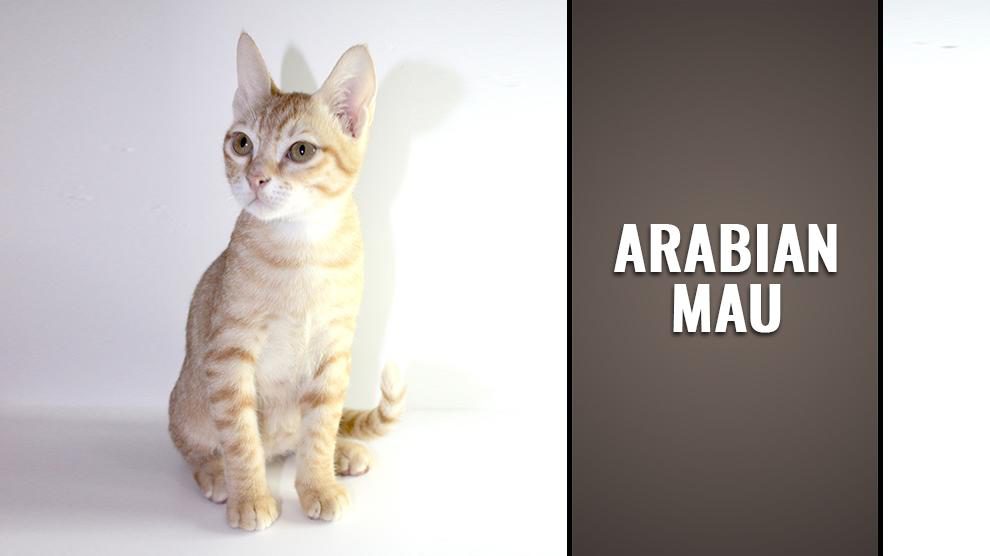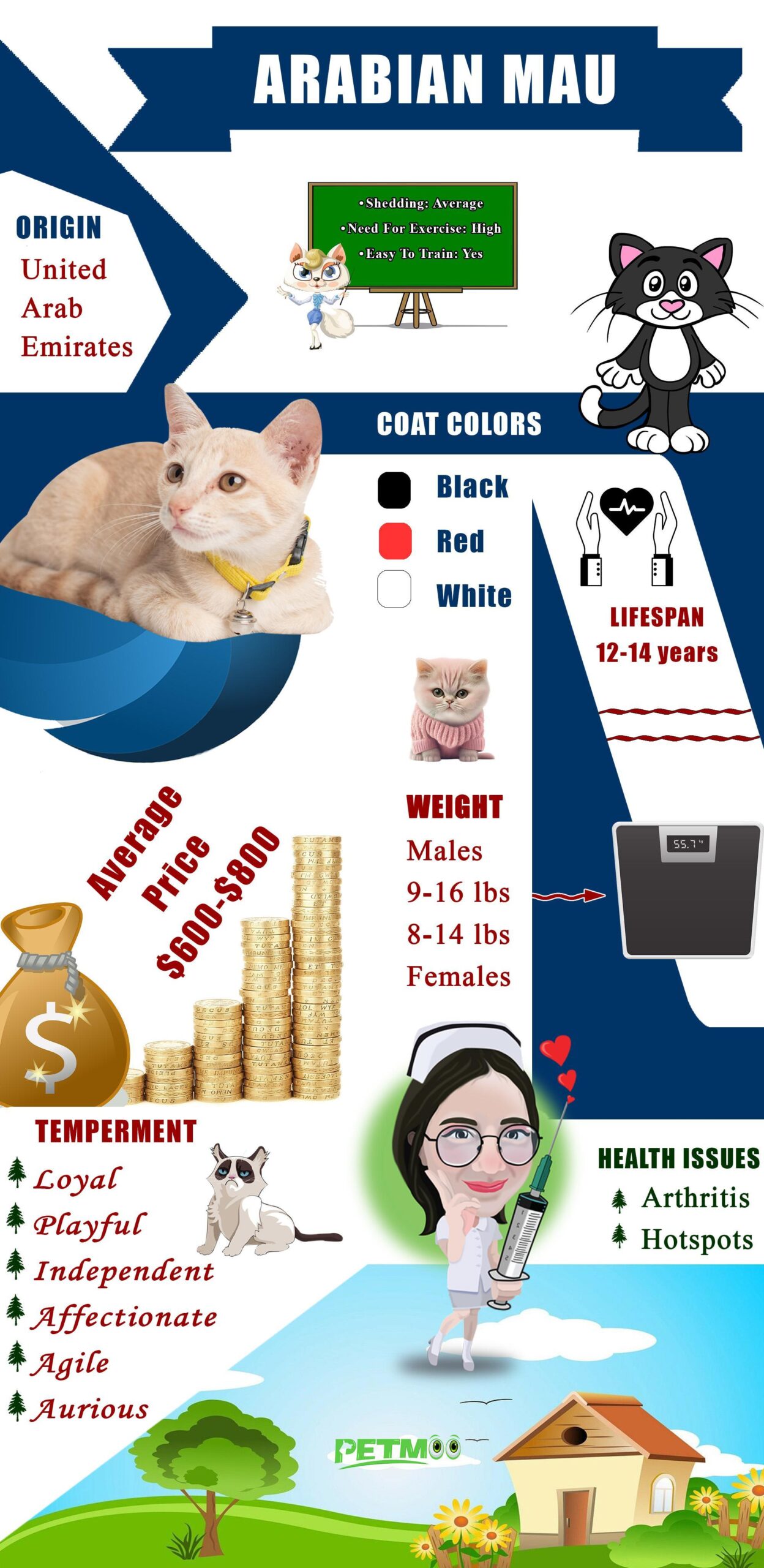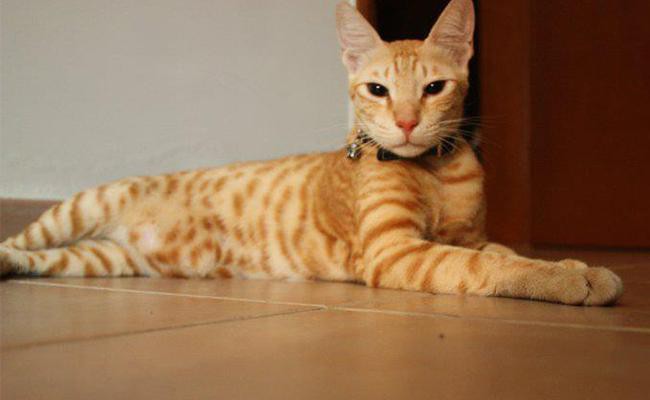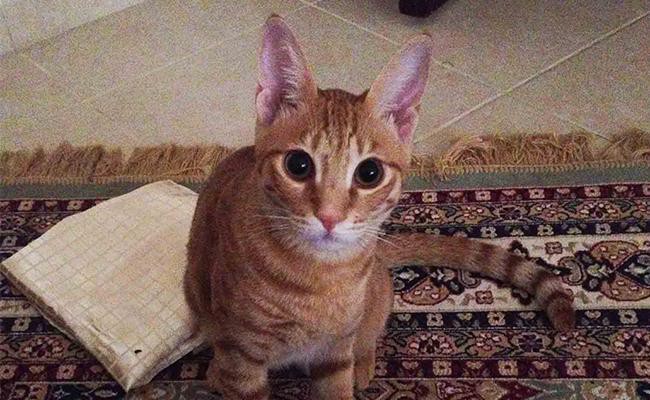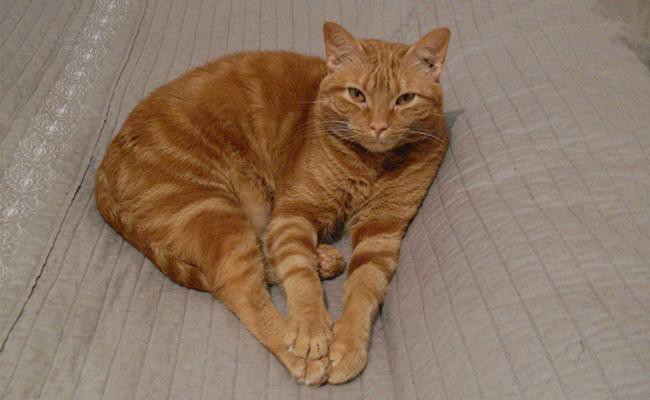Cat Pregnancy Calculator And Timeline
If you wish to have a short-haired domestic cat, Arabian Mau may be a fantastic choice!
Originated from the Arabian Peninsula, this most popular domestic cat has excellent adaptability to hot climates. It does best at homes where it gets a lot of playtime and enrichment. This gentle and affectionate cat agrees well as both an indoor and outdoor cat.
The Arabian Mau cats are low-maintenance pets, too! It is capable of taking care of itself and will follow you around the house. This cat is healthy compared with other breeds, and you can spend more than 10 years with them!
Let’s explore more about this breed!
Arabian Mau Breed Characteristics Sheet
- Origin: United Arab Emirates
- Size: Medium to large
- Lifespan: 12-14 years
- Weight: 9-16 lbs (males); 8-14 lbs (females)
- Coat Appearance: Short, Shiny
- Coat Colors: Black, Red, White
- Temperament: Loyal, playful, independent, affectionate, agile, curious
- Good With Children: Yes
- Intelligence Level: High
- Good With Pets: Yes
- Hypoallergenic: No
- Grooming: Less
- Shedding: Average
- Need For Exercise: High
- Easy To Train: Yes
- Good For First Time Owners: Yes
- Health Issues: Arthritis, Hotspots
- Litter Size: NA
- Average Price: $600-$800
Arabian Mau History
The Arabian Mau cat is the oldest desert cat and is expected in the Arabian Peninsula, including Saudi Arabia, Qatar, Oman, Kuwait, and United Arab Emirates. One of the natural cat breeds, it exists for the past 1000 years.
It is believed that the Arabian Mau has been evolved from the African wildcat. Another wide belief is that Ms. Petra Mueller, who lives with 50 Arabian Mau, developed this breed.
You can find the Arabian Mau’s life as street cats roaming independently in the Arabian Peninsula. Only in recent years, this breed got the recognition as an actual breed.
This breed has the Egyptian word “Mau” for “cat.” The Arabian Mau is now a popular choice in the Middle East. It is the first desert cat to have the recognition by the World Cat Federation.
The Emirates Feline Federation (EFF) also recognized this breed. A few fancier and breeder organizations and cat registry recognized it as a formal breed.
Arabian Mau Appearance And Coat Color
The Arabian Mau cats will appeal to you with its large eyes and round, broadhead. It has a curved, concave nose with clearly pronounced whisker pads. The chin is firm, and a distinct feature of this breed is the large, pointed ears.
Its ears will help it to release excess heat from the body. The tail is of medium length and tapers towards the tip. These cats have large body structure with well-developed muscles. The legs are long, and the paws are oval-shaped.
This breed has a short, glossy coat that lies close to the body. It has no undercoat. Most of these cats will have standard eye color. But, some will have bright, green eyes. But, there is no relation between the eye and coat colors.
Arabian Mau Coat Colors
These felines will come in a wide variety of colors and patterns. They will come in a combination of black, white, gray, and brown. But, you can find them mostly in red, white, black and brown.
Arabian Mau Size And Lifespan
Arabian Mau cats are medium-sized cats. Males are usually heavier than females. The male Arabian Mau cats weigh around 9 to 16 lbs. And the females can weigh anywhere between 8 and 14 pounds.
This breed is healthy and has no known health issues. It can live for about 12 to1 4 years. If given proper care, this breed will lead a happy and healthy life.
Arabian Mau Personality
The Arabian Mau cat is an affectionate and loving feline. It is also a trustworthy companion to you. This breed plays many roles and will serve as a
Domestic pet – It is much popular as a household pet and suits well to both indoors and outdoors.
Social cat – This breed is friendly and gets along well with children and other animals.
Vocal – These cats are vocal and love to talk to their owners. They may make the sound “meow” at a very high pitch sometimes, which seems demanding.
Adaptable – It is a desert cat and can adapt to any environment.
Arabian Mau is a very territorial breed and is a loyal, active, and outgoing cat. Desert cats are well adapted to the hot, Middle Eastern environment.
These kitties are active at night, preferring to sleep during the day just like their ancestors did to avoid the desert’s hot sun.
Arabian Mau Grooming
These cats need less maintenance as the coat doesn’t have long fur. And, the Arabian Mau sheds in an average amount and is capable of taking self-care. So, you can easily groom it with brushing. But, primary care is required for any cat breed.
- Brush its coat using a soft brush once a week to remove dead hairs and keep the coat looking shiny and healthy. It will also help in the distribution of natural oils throughout the coat.
- Check their eyes weekly once for discharge and wipe them using a wet cloth to remove residue. Ensure to use different fabrics to avoid the spreading of infection.
- Clean their ears with a dampened cotton cloth weekly once.
- Brush their teeth at least a few days a week to avoid periodontal disease.
- This cat doesn’t need bathing unless it is dirty.
Make the grooming experience wonderful for this cat by making it adaptable from a young age.
Arabian Mau Training And Exercise
The Arabian Mau cat is an intelligent and attentive breed. You may think of this breed as a tough one because it survived in the desert. But, it is a sweet-hearted cat. So, training this feline will be a delight to its master.
You can provide socialization training to these cats from a young age to fine-tune these cats’ personalities.
Socialization training
This cat can be shy and reserved. It may also get scared by sudden movements or noises. So, make sure to socialize your feline so that it gets used to different people.
Reward-based training
Treats can be a motivation to these cats. Offer cat treats as rewards to them if they display a desirable behavior.
Arabian Mau Exercise
This cat is an active and energetic feline. It likes to play and needs more interaction and attention from its owners. So, regular play sessions are essential for this agile and curious tabby to feel happy. You can also teach more amusing tricks to this intelligent feline.
Providing at least 10 to 15 minutes of exercise every day will maintain good physical and mental health.
- Let it run in the garden of your home and play free. But, ensure that the yard is fenced because these tabbies are high jumpers. If your home has limited space, place a cat tree at one corner of your home to play.
- You can also provide them more toys to play with. Puzzle toys can be a challenge to their brains, and chase toys will help them burn calories.
Tips
- One needs to be patient during play because felines are sprinters and will play in a surge.
- Provide more attention while they play.
Arabian Mau Food
Arabian Mau cats have adapted to a desert lifestyle and searched for foods themselves. So, they are not fussy about foods and love eating. But, don’t expect it to be excited about whatever you try to give him for eating.
These cats need a high percentage of meat for fat and protein in comparison with their owners. So, you should be vigilant in providing the foods to these cats. It is better to follow a few tips and ensure a few things while you feed them.
Tips
- When you purchase cat foods from pet stores, make sure that the packaging meets the requirements of the American Association of Feed Control Officials (AAFCO).
- Ignore marketing terms such as “natural,” “gourmet,” “premium,” “super-premium,” etc. when you buy cat foods from pet stores.
- These cats will enjoy small meals in a day. So, always feed in small portions and don’t provide a whole, large meal to them.
- Don’t overboard them either with snacks or treats as they may cut down their real dietary requirements.
- While swapping the foods, replace the old food with a small amount of new food for a week. This will help them with the easy transition of fresh foods and reduce the chances of stomach discomfort.
Warnings
- Don’t feed dog foods to your tabby as they can be fatal to felines over time. Also, dog foods contain more carbohydrates and won’t meet their dietary needs.
- As these cats tend to put on too much weight, it will lead to diabetes in them. So, avoid feeding foods rich in carbohydrates.
It is always advisable to consult the vet for the type of food (dry or wet) to feed the Arabian Mau. The vet will help you identify foods that suit the cat’s weight and daily calorie count.
Arabian Mau Names
Naming a cat is actually an exciting experience. You involve your family, browse a ton of names, do a lot of research before naming your feline friend. Here, to do your job easier, we have given a few male and female feline names with meanings.
Arabian Mau Male Names
- Amir – Meaning “prince” in the Arabic language
- Fazil – Means “Superior” in Arabic
- Hani – “Happy” in Arabic
- Jafar – In Arabic language, it means “small stream”
- Min – In the Korean language, this name means “clever”
- Nobu – Means “faith” in Japanese
- Nina – Refers to small-sized cats
- Salim – Means “peace” in Arabic
- Torata – Name of an Italian cake
- Zaki – “Pure” in Arabic
Arabian Mau Female Names
- Bibi – The synonym of mistress, a surname used by Pakistani, Bangladeshi and some British Indian women
- Farrah – Meaning “pretty” in the Arabic language
- Greta – In German language, it means “precious”
- Layla – Refers to “woman of the night”
- Mana – Meaning “love” in Japanese
- Rina – In the Japanese language, it means “jasmine”
- Ruby – Name of a red-colored gemstone
- Taka – Meaning “honorable” in Japanese
- Zaina – Meaning “lovely” in Arabic
- Zara – In Arabic language, it means “radiance”
Arabian Mau Health Problems
Generally, this breed is healthy, and no genetic or breed-specific diseases are documented for these cats. They may be prone to heart, kidney, and oral health issues, which are common to all cat breeds.
So, the Arabian Mau doesn’t have known illnesses like other cats. It tends to be healthy and less prone to severe health conditions. This breed may get
Arthritis
It is a health condition that affects joints and will cause pain and discomfort. It occurs most often in old cats, but young cats may also be prone to this disease.
Causes
Aging is the primary cause of arthritis in your tabby. Hip dysplasia is also the next major factor to consider in the case of arthritis.
Signs
You can suspect arthritis in your tabby with a few signs.
- Changes in your tabby’s activity and behavior
- Your cat may do bunny hop or move differently than usual
- The cat will stop using the litter box
- Lethargy
Treatment
Several treatment options are available to treat this disease.
- The vet may prescribe non-steroidal anti-inflammatory drugs (NSAIDs) to control inflammation and pain in joints.
- A few alternative therapies, such as massage, hydrotherapy, and laser therapy, can reduce joint pain in cats.
- Dietary supplements such as omega-3 fatty acids, glucosamine, and chondroitin will support the joints. But, you should provide them to your cat with a vet’s approval.
Home-based treatment
Weight loss is the best solution for arthritis. You can also provide comfort to an arthritic tabby at your home in a few ways.
- A blanket, heated bed, or a hot water bottle may provide pain relief and comfort for older cats.
- Make sure your tabby has easy access to its food, water bowls, and litter box.
- Groom the areas that are hard to reach.
Hotspots
It is a common health concern in tabbies. The spots will be red, dry, and itchy and will cause hair loss in it. Feline hot spots are also known as acute moist dermatitis.
A “hot spot” on your cat (or even on your dog) will look like an area of fur that is missing. It could be just a bald patch, or the bald patch could also resemble a lesion, with the skin broken and fluid oozing from the skin.
These painful patches of skin infection require veterinary attention and result from the cat biting or licking excessively. In addition to treating the hot spot, the original cause of skin irritation should be identified and corrected to prevent further flare-ups.
Causes
Your tabby may get hot spots due to food and environmental allergies.
Food allergies – Carbohydrate-rich foods such as wheat, grains, rice, corn, etc. may cause allergies. Sometimes, fillers, preservatives, or other additives will also cause allergies.
Environmental allergies – Your cat may get allergies from household cleaners such as odor reducer.
Signs
You can identify a few signs of this disease
- Bald spots
- Hair loss
- Inflammation in skin
Treatment
A raw diet will help to get rid of hot spots. But it will work only sometimes. So, it is better to consult the vet. He may suggest an anti-itching spray to keep the tabby comfortable.
Cortisone shots will also clear up hot spots. Some felines may need two to three shots once every 2 weeks to clear up the spots.
Home-based remedies
Cats will often lick the hot spots, making them raw and increase their size. So, the best way to prevent locking is to use a soft cone. It will heal the hot spots without aggravation.
Arabian Mau Price
You have to pay more money to purchase an Arabian Mau cat. It will cost around $600 to $800 on average.

